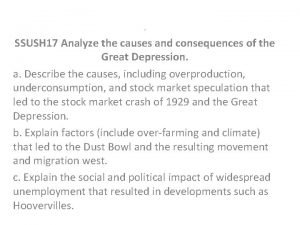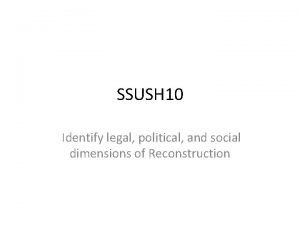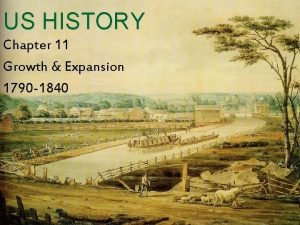Impact of Expansion and Growth SSUSH 6 The







- Slides: 7

Impact of Expansion and Growth SSUSH 6 The student will analyze the impact of territorial expansion and population growth and the impact of this growth in the early decades of the new nation. b. Describe Jefferson’s diplomacy in obtaining the Louisiana Purchase from France and the territory’s exploration by Lewis and Clark. d. Describe the construction of the Erie Canal, the rise of New York City, and the development of the nation’s infrastructure.

The Louisiana Purchase

The Louisiana Purchase In 1803, US President Thomas Jefferson arranged the purchase of the Louisiana Territory from France. The Louisiana Purchase almost doubled the area of the United States. The Louisiana Territory was west of the Mississippi River to the Rocky Mountains, stretching from the Gulf of Mexico to Canada. President Jefferson wanted to make sure that the US could use the Mississippi River for commerce, so he had the American ambassador to France to negotiate to buy the port of New Orleans. This would allow the US access between the Gulf of Mexico and the Mississippi River. They were very surprised when the French offered to sell the entire Louisiana Territory for 15 million dollars. The purchase was completed on April 30, 1803.

Lewis and Clark In 1804, Jefferson sent Lewis and Clark to map the newly-acquired western US territory They returned in 1806 with maps, newlydiscovered animals, and information about Indian tribes. Lewis and Clark traveled from Missouri west to Oregon and back again, mapping much of the area.

Construction of the Erie Canal The Erie Canal, begun in 1817, was one of the most ambitious construction projects of nineteenth-century America. It was longer by far than any other canal previously built in Europe or America, crossing rivers and valleys, cutting through deep rock, and passing through marshes and forests in its 363 -mile course across New York State. From the opening days of the canal in 1825, thousands of people from America and Europe took advantage of the new inland waterway and its faster, smoother mode of travel. Thousands more were employed on the canal operating cargo boats that transported goods such as salt, flour, or textiles between Buffalo and New York City.

Impact of the Erie Canal The Erie Canal proved to be the key that unlocked an enormous series of social and economic changes in the young nation. The Canal spurred the first great westward movement of American settlers, gave access to the rich land resources west of the Appalachians and made New York the preeminent commercial city in the United States. Within 15 years of the Canal's opening, New York was the busiest port in America, moving tonnages greater than Boston, Baltimore and New Orleans combined. The impact on the rest of the State can be seen by looking at a modern map. With the exception of Binghamton and Elmira, every major city in New York falls along the trade route established by the Erie Canal, from New York City to Albany. Nearly 80% of upstate New York's population lives within a 25 mile radius of the Erie Canal.

Population Growth In the early 1800’s the population in cities, particularly in the Northeast increased sharply Poor city dwellers lived in crowded cheap housing Problems Cities Could rarely keep up with demands for fire and police protections. Contaminated drinking water Inadequate disposal of sewage Garbage Epidemic disease












